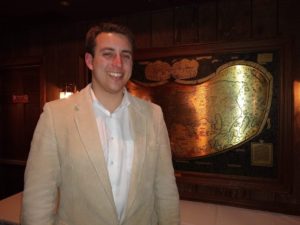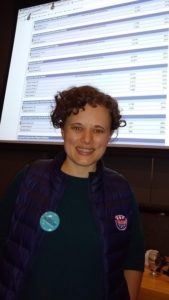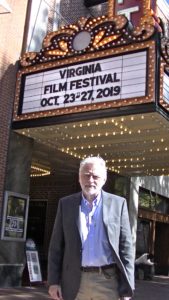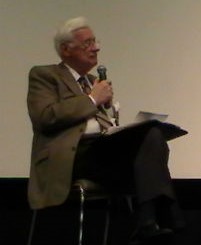This week on The Score – Did we learn anything from the results on Election Day? What do winning candidates plan to do now that they are elected officials? Have American businesses been “Fishing with Dynamite”?
http://bearingdrift.com/wp-content/uploads/TheScore_Nov09-2019_FullHour.mp3 [1]There was big election news in Virginia and around the country this week. For the first time since the twentieth century, Democrats took control of the General Assembly and all five statewide offices. The Score talked with both winning and losing candidates on election night, as well as with a leading academic observer of Virginia politics.
Senate District 25
Elliott Harding was an independent candidate for the Virginia State Senate in the 25th District, running against incumbent Democrat Creigh Deeds. While he was not elected, Harding exceeded the vote totals that his campaign managers predicted when he entered the race.
 Harding has previously been a guest on The Score to discuss double jeopardy [2], the Second Amendment [3], independent candidates [4] for public office, and student debt and Social Security [5], as well as his own campaign [6] for the state Senate.
Harding has previously been a guest on The Score to discuss double jeopardy [2], the Second Amendment [3], independent candidates [4] for public office, and student debt and Social Security [5], as well as his own campaign [6] for the state Senate.
We spoke at the Aberdeen Barn [7] restaurant in Charlottesville soon after the election results were announced on Tuesday evening. You can follow Elliott Harding on Twitter at @emh434 [8] or @Harding4VA [9].
 Senator Creigh Deeds was first elected to his current office in a special election in 2001. On Tuesday, he was re-elected for his fifth full four-year term. We chatted at the local Democrats’ victory party at Three Notch’d Brewing Company [10] in Charlottesville. You’ll hear a lot of cheers and noise in the background. He starts by telling me how to drive across the 25th district without leaving it, having noted that the last time we spoke (Labor Day in Buena Vista [11]) he had mistakenly said that it was impossible to drive through the district without crossing into an adjoining district. It’s still quite hard to do it, he conceded.
Senator Creigh Deeds was first elected to his current office in a special election in 2001. On Tuesday, he was re-elected for his fifth full four-year term. We chatted at the local Democrats’ victory party at Three Notch’d Brewing Company [10] in Charlottesville. You’ll hear a lot of cheers and noise in the background. He starts by telling me how to drive across the 25th district without leaving it, having noted that the last time we spoke (Labor Day in Buena Vista [11]) he had mistakenly said that it was impossible to drive through the district without crossing into an adjoining district. It’s still quite hard to do it, he conceded.
I expect Senator Deeds will be held to what he promises in this excerpt, about 3 minutes 40 seconds into our conversation:
[Senate Democrats have] spent the last six or eight months meeting on a pretty regular basis, the policy committee, to make sure we’re prepared once we get the majority, because the writing has been on the wall that this was going to happen. And it’s important for me, it’s important for us as Democrats, that we produce some real results, but that we don’t overreach.
Creigh Deeds has previously been a guest on The Score in April 2018 [12] and December 2018 [13], among other occasions. You can follow him on Twitter at @CreighDeeds [14].
Election Night in Charlottesville
 Delegate-elect Sally Hudson [15] ran unopposed for the 57th House seat vacated by retiring Delegate David Toscano. An assistant professor at the Batten School for Public Policy at the University of Virginia, Hudson earned a Ph.D. in economics from the Massachusetts Institute of Technology (MIT). Among her publications (co-authored with Josh Angrist, David Autor, and Amanda Pallais) is “Evaluating Econometric Evaluations of Post-Secondary Aid [16],” in American Economic Review: Papers & Proceedings (2015).
Delegate-elect Sally Hudson [15] ran unopposed for the 57th House seat vacated by retiring Delegate David Toscano. An assistant professor at the Batten School for Public Policy at the University of Virginia, Hudson earned a Ph.D. in economics from the Massachusetts Institute of Technology (MIT). Among her publications (co-authored with Josh Angrist, David Autor, and Amanda Pallais) is “Evaluating Econometric Evaluations of Post-Secondary Aid [16],” in American Economic Review: Papers & Proceedings (2015).
When she was previously a guest [17] on The Score, we talked about her ideas for election reform, including Ranked Choice Voting, or RCV, a reform she advocates along with re-elected Delegate Nick Freitas, who won as a write-in candidate on Tuesday. That topic came up again on Election Night. As it happens, New York City voters on Tuesday chose to use a form of RCV [18] in future local elections.
Dr. Hudson is on Twitter as @SallyLHudson [19].
 Charlottesville Democrats once again swept the election for City Council. Three candidates were on their ticket: Lloyd Snook, Sena Magill, and Michael Payne. I spoke to Payne, a self-described progressive, on Election Night about his ideas about housing and other topics. He is on Twitter as @MPayneCville [20].
Charlottesville Democrats once again swept the election for City Council. Three candidates were on their ticket: Lloyd Snook, Sena Magill, and Michael Payne. I spoke to Payne, a self-described progressive, on Election Night about his ideas about housing and other topics. He is on Twitter as @MPayneCville [20].
Election Assessment
On the day after the election in Virginia, I spoke by telephone with Dr. Stephen Farnsworth, a political scientist at the University of Mary Washington in Fredericksburg and a long-time observer of politics in the Old Dominion.
Farnsworth is co-author (with S. Robert Lichter) of the forthcoming Late Night with Trump: Political Humor and the American Presidency [21] and (also with Lichter) of The Nightly News Nightmare: Media Coverage of U.S. Presidential Elections, 1988-2008 [22] (2010). He is author of Presidential Communication and Character: White House News Management from Clinton and Cable to Twitter and Trump [23] (2018) and Spinner in Chief: How Presidents Sell Their Policies and Themselves [24] (2018).
Dr. Farnsworth was previously a guest on The Score [25] in September 2018. He is on Twitter as @drsfarnsworth [26]. I started off by asking if he was surprised by any of the election results.
‘Fishing with Dynamite’
Last week on The Score [27], we had a chance to talk with several film makers at the 32nd annual Virginia Film Festival, including actor Dennis Christopher who was celebrating the fortieth anniversary of the Oscar-winning movie, Breaking Away.
 This week we have another Oscar winner, documentary film maker Paul Wagner, who is based in Charlottesville. His newest film is called a panel discussion [28] moderated by Margaret Franklin of the CFA Institute that featured Wagner, producers Jenny Mead and Bidhan Parmar, as well as one of the film’s subjects, Ed Freeman.
This week we have another Oscar winner, documentary film maker Paul Wagner, who is based in Charlottesville. His newest film is called a panel discussion [28] moderated by Margaret Franklin of the CFA Institute that featured Wagner, producers Jenny Mead and Bidhan Parmar, as well as one of the film’s subjects, Ed Freeman.
Last year [29], Wagner spoke to The Score about Black in Blue [30], a documentary about the first African-American football players who took the field for the University of Kentucky in the mid-1960s. He won an Academy Award in 1984 for his documentary short, The Stone Carvers [31], while his 1998 film, A Paralyzing Fear: The Story of Polio in America [32], won an Emmy Award and was nominated for two others.
Paul Wagner is on Twitter as @Lhasan2 [33].
From the Archives
 One of the founders of the Virginia Film Festival was former Governor Gerald Baliles, who passed away [34] late last month. I was able to ask him about the beginnings of the film festival in November 2013, after he moderated a panel discussion [35] about the documentary film, Our Nixon [36], with producer Brian L. Frye and the Miller Center’s Ken Hughes.
One of the founders of the Virginia Film Festival was former Governor Gerald Baliles, who passed away [34] late last month. I was able to ask him about the beginnings of the film festival in November 2013, after he moderated a panel discussion [35] about the documentary film, Our Nixon [36], with producer Brian L. Frye and the Miller Center’s Ken Hughes.
In this brief interview [37] (conducted precisely six years ago, on November 10, 2013), he reveals how, as a member of the House of Delegates, he was able to use a parliamentary trick to establish the Virginia Film Office.
In addition to having served in the Virginia General Assembly and as governor, he was the Commonwealth’s Attorney General and led the University of Virginia’s Miller Center for Public Affairs. He also wrote the 1995 book, Preserving the Chesapeake Bay: Lessons in the Political Reality of Natural Resource Stewardship [38].
Finally, if you’ve read this far, you’ll appreciate Saturday’s edition [39] of the comic strip, “Sherman’s Lagoon.” I know I did.